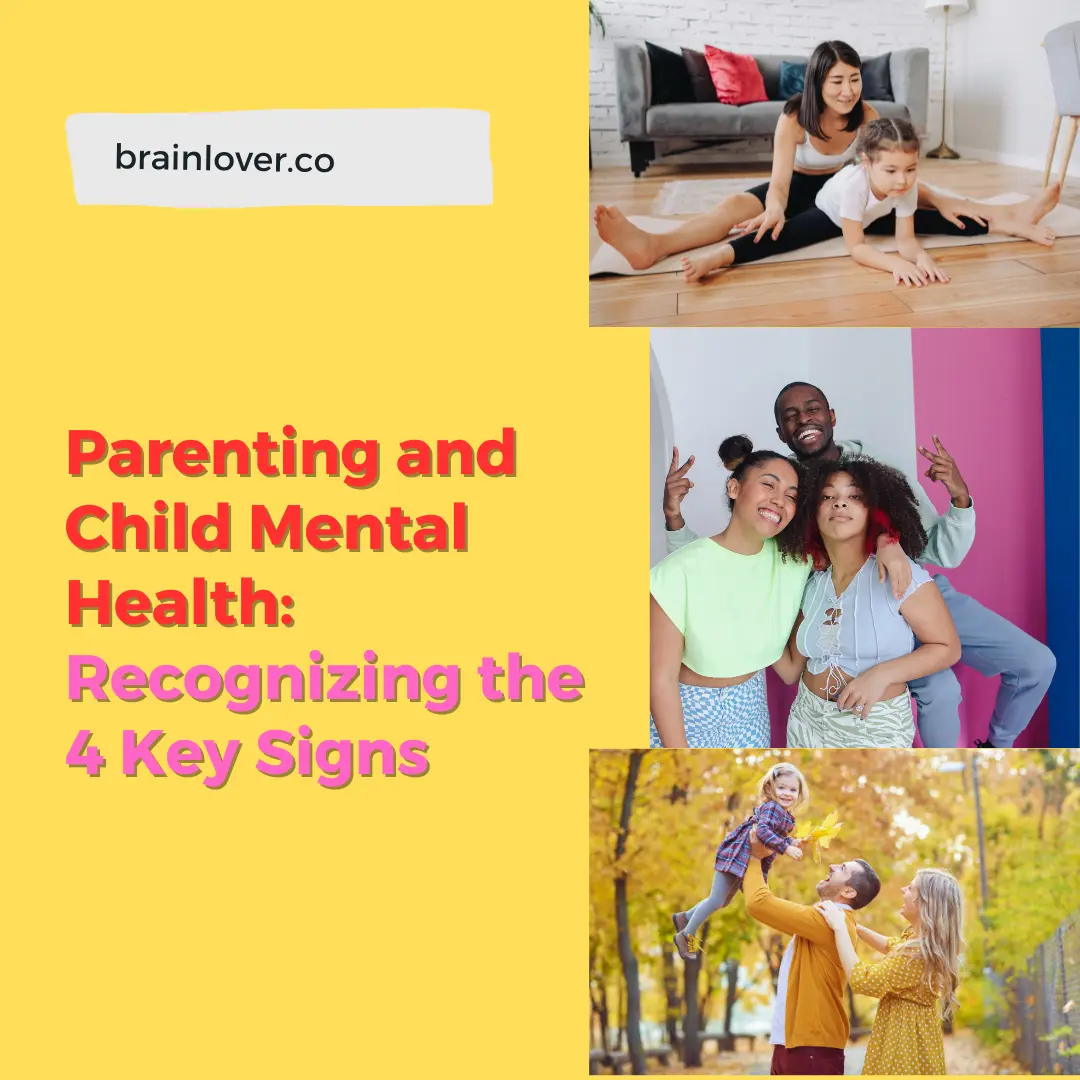Parenting and Child Mental Health: Recognizing the 4 Key Signs

Parenting and child mental health are crucial topics every parent should know well.
Recognizing the signs of mental health issues in children is essential in providing them with the support and care they need.
In this guide, we will explore the common signs of mental health issues in children and discuss when parents should seek professional help.
The Early Warning Signs: What to Look For

Identifying the early warning signs of mental health issues in children is a critical step toward ensuring their emotional and psychological well-being.
These signs can often be subtle and easily overlooked, making parents need to remain vigilant and observant of their child’s behavior and emotional state.
One of the first indicators may be a noticeable shift in behavior or mood that does not align with the child’s standard patterns.
This could manifest as increased irritability, sadness, or aggression, which persists over time and is not typical of their usual demeanor.
Another significant sign to watch for is a marked change in social interactions.
Children grappling with mental health issues might withdraw from friends and family, showing less interest in social activities they previously enjoyed.
This isolation can be a red flag, signaling deeper emotional turmoil.
Additionally, changes in sleep patterns and eating habits should not be ignored.
A sudden increase or decrease in appetite, difficulty sleeping, or sleeping too much can all indicate mental distress.
Academic performance can also provide clues to a child’s mental health.
A decline in grades, loss of interest in schoolwork, or an inability to concentrate could be symptomatic of underlying issues that need attention.
Lastly, expressions of hopelessness or comments about self-harm are urgent signs that require immediate action.
Parents must approach these signs with a sense of urgency and a commitment to understanding the root cause.
While any one of these signs alone might not signify a mental health issue, a combination of these behaviors, especially if they persist or worsen over time, underscores the need for a deeper assessment.
Staying informed and proactive can facilitate timely intervention and support, laying a foundation for children’s healthier mental and emotional development.
Emotional Shifts and Behavioral Changes: Decoding the Signs

Emotional shifts and behavioral changes in children are potent indicators that should not be ignored. These alterations in their usual demeanor can signal underlying mental health concerns that require immediate attention.
It’s crucial to be aware of and understand these changes, as they often serve as the initial signs that a child is grappling with emotional distress.
One significant area to monitor is your child’s emotional responses to everyday situations.
An escalation in anger, a noticeable increase in worry or fear, or an uncharacteristic tendency towards tearfulness can all be significant.
Such emotional volatility often suggests that the child is experiencing internal conflicts or stressors that they find challenging to manage or articulate.
Behaviorally, watch for deviations from their everyday routines or interests.
A sudden disinterest in activities that previously brought joy or avoidance of social interactions can be telling.
These changes may indicate feelings of sadness, anxiety, or isolation, hinting at deeper psychological issues.
Additionally, observe your child’s reaction to routine changes or stress.
An increased sensitivity or an inability to adapt to minor changes in their environment could reveal heightened anxiety or an underlying mood disorder.
Frequent physical complaints without a clear medical cause, such as stomachaches or headaches, can also be manifestations of stress or anxiety in children.
Understanding these signs and taking them seriously is paramount.
They are not simply phases or typical childhood behavior but can be cries for help that necessitate a compassionate and comprehensive response.
Recognizing these emotional shifts and behavioral changes is the first step toward providing the necessary support and intervention your child needs to navigate their mental health challenges.
Proactivity in this regard can significantly alter the course of their emotional and psychological well-being, ensuring they have the resilience and tools needed to thrive.
The Impact of Social Media and Technology

The pervasive influence of social media and technology on the mental health of children is an issue that demands immediate attention and action.
While offering unprecedented access to information and connectivity, the digital age also presents unique challenges that can affect a child’s emotional and psychological well-being.
Excessive engagement with these platforms has been linked to increased levels of anxiety, depression, and feelings of inadequacy among young users.
Children are particularly susceptible to the pressures of constant online presence in their formative years.
Cyberbullying, a phenomenon almost exclusive to this generation, exposes them to relentless scrutiny and criticism, which can lead to severe emotional distress.
Moreover, the compulsion to curate a perfect life online can create unrealistic standards of success and happiness, contributing to a skewed self-image and dissatisfaction.
Furthermore, the sheer amount of screen time can disrupt critical developmental activities.
It can infringe upon crucial face-to-face interactions, physical play, and even sleep—all essential to a healthy childhood.
The diminishing quality and quantity of sleep due to late-night screen usage is a concern that has been directly linked to poorer mental health outcomes.
Recognizing these risks, parents and guardians must establish boundaries around the use of technology.
Monitoring and limiting screen time, encouraging offline activities, and fostering open dialogues about online experiences are critical steps in protecting and nurturing our children’s mental health in the digital era.
Awareness and proactive measures can help mitigate the negative impacts of social media and technology, ensuring a safer and healthier digital environment for our youth.
When to Seek Professional Help: Navigating the Next Steps
Recognizing the signs of mental health issues in your child is a vital first step, but understanding when and how to seek professional help is equally crucial.
Suppose your child exhibits continuous signs of distress, such as prolonged mood changes, intense feelings of sadness, withdrawal from social interactions, significant changes in eating and sleeping patterns, or expressions of hopelessness.
In that case, it is time to take action.
These persistent symptoms warrant a professional evaluation, as they may indicate underlying mental health conditions that require intervention.
Begin by consulting with your child’s pediatrician, who can provide an initial assessment and, if necessary, refer you to a specialist in child psychology or psychiatry.
Schools are also valuable resources; school counselors can support and recommend community-based mental health services tailored to your child’s needs.
It is important to choose professionals who are not only experienced in dealing with children’s mental health issues but also make your child feel safe and understood.
Do not hesitate to seek out multiple opinions if you feel unsatisfied with the initial advice or treatment plan.
Mental health care is not one-size-fits-all, and finding the right approach for your child might take time. Remember, early intervention is critical to effectively addressing mental health issues.
Acting promptly provides your child the best possible chance for recovery and resilience.
As you navigate this process, keep the lines of communication open with your child. Reassure them of your love and support, and make them feel involved in decisions about their care.
This journey may be challenging, but your proactive and informed approach can make a significant difference in your child’s mental health journey.
The Role of the Parent: Support and Advocacy
In navigating the complexities of child mental health, a parent’s role transcends mere guardianship to embody that of an unwavering advocate and steadfast support system.
Your involvement is paramount in fostering an environment where your child feels secure enough to share their struggles, knowing they will be met with empathy and action, not dismissal.
To effectively champion your child’s mental health, it is essential to cultivate a deep understanding of their world.
This means actively listening to their concerns, acknowledging their feelings, and validating their experiences.
An informed parent is better equipped to recognize when changes in behavior signal deeper issues rather than typical developmental phases.
Equally important is the pursuit of knowledge regarding available resources and treatments.
Your advocacy ensures that your child can access the best possible care tailored to their unique needs.
This may involve collaborating with educators to implement supportive measures at school or navigating healthcare systems to connect with child mental health professionals.
Creating a dialogue about mental health at home also plays a critical role.
By discussing these topics openly, you demystify mental health issues, teaching your child that seeking help is not only acceptable but encouraged.
This open line of communication builds trust and can make it easier for your child to come to you with their problems.
Remember, advocating for your child’s mental health is a journey that requires patience, perseverance, and unconditional support.
While challenges are inevitable, your proactive approach and advocacy lay the groundwork for your child’s resilience and well-being.
You send a powerful message through your actions that their mental health is a priority, and they are not alone in their journey.
Sources
Most cases of mental health disorders starting by age 14 are undetected and untreated.








